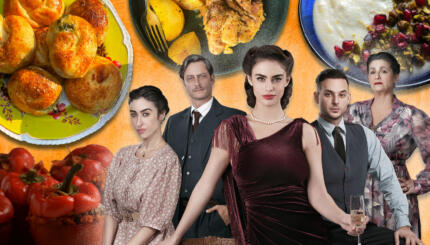This year for Mother’s day we reached out to one of the best mother-daughter duos we know — Raffi Freedman-Gurspan and her mother Marion Freedman-Gurspan — and asked them to share a little bit about parenting, how their politics and LGBTQ activism informed their family life, and more!
Raffi and Marion have been long-time friends of Keshet. In fact, we honored Raffi with the Hachamat Lev Award at OUTstanding! Boston 2018! Below, find the transcript of their conversation with each other.
Raffi: You and Daddy adopted me internationally from Honduras as an infant – what questions issues or concerns did you have about raising me as an American Jew while also knowing I would be a Jew of Color in the United States? What advice would you give yourself then from your perspective now?
Marion: We were concerned about finding a place within the Boston Jewish community where you would fit in, which meant finding the right Hebrew School and synagogue where there were other children of color. We also wanted to foster your Latinx identity which was a bit harder, since so many of the celebrations center on Christian holidays. From today’s perspective, I would advise myself to go directly to the rabbis and the educational director, express my concerns about the rarity of Jews of color, and ask them how I could work with them to make sure that the students learned that there are Jews of color all over the world, people who were born to Jewish parents and people adopted by Jewish parents. At the time you were growing up, it seemed synagogues were just taking a beginning step, which was to make sure that students learned adoption was historically a part of the Jewish tradition. The advice I would give to myself comes from you. You have told me that we didn’t prepare you enough for the racism you might encounter, I would try to give you more of a heads up about how others might treat you without making you fearful or undermining your self-confidence.
Raffi: What important aspects or values of Judaism do you think were important for you to raise me with? Do you see any of them in who I am today?
Marion: Most important of all, we wanted you to be a mensch. We wanted you to care about others, and to respect others as well as yourself. Tikkun Olam was part of your upbringing. We put a high value on formal education, but also on learning about and engaging with the richness and diversity of the world around you. And we wanted you to have a sense of humor. Not to be too self-congratulatory, but by these measures we did a pretty good job as we see all of these in you today.
Raffi: I came out first as gay, and later on again as a trans woman, in an American Jewish setting. How did you experience being a parent of an LGBTQ person in the American Jewish community? What advice would you give Jewish parents of LGBTQ-identified youth today?
Marion: We were very lucky, or you could say our homework paid off, but we have had an easy time. We live in Brookline which we chose because it was liberal and had at least some diversity. Both synagogues we have belonged to are leaders in LGBTQ acceptance and the Jewish organizations with which we interact –Keshet of course, JCRC, ADL are all supportive. My advice to Jewish parents of LGBTQ youth is not different from that we would give to any parent. Establish open communication with your children from an early age. This can be hard. Not only do you need to listen and observe, but you need to share your concerns as a parent and also be able to say no. You need to recognize that your child is more vulnerable than most others but also that they have had the strength to assert their identity. You need to prepare them as much as possible for being teased or bullied. If you sense that something is wrong you need to find out what is going on and be willing to advocate and to act if you assess that this is something the child cannot or should not have to handle alone, whether it be talking to a teacher, the parents of a bully, or anyone else. And perhaps most importantly, you need to accept the fact that your child is LGBTQ, learn as much about what it means to your child, and find those places where your child, and you can be welcomed and supported. Keshet exists for a reason.
Raffi: As someone who plans to be a mother herself someday, what advice would you give me? Anything in particular from a Jewish perspective?
Marion: As a mother, I would say motherhood is the hardest job you will ever have, but it is also the most rewarding. Be here now – be in the moment with your child. People tend to parent as they were parented. If you liked how I handled something, do the same thing. If not, do something different, but know that your child may not react to things the same way you did. Don’t be afraid to ask for help, support or advice, but above all, trust your judgment. Remember, children like rituals – light those Shabbos candles as you do now, read those bedtime stories, play that music. Engage them in the Jewish community –send them to Hebrew School, let synagogue be a fun place for them to go, and let them run around with a flag on Yom Ha’atzmaut. Let them follow their own passions. Enjoy watching the film unfold. You’ll do fine!


